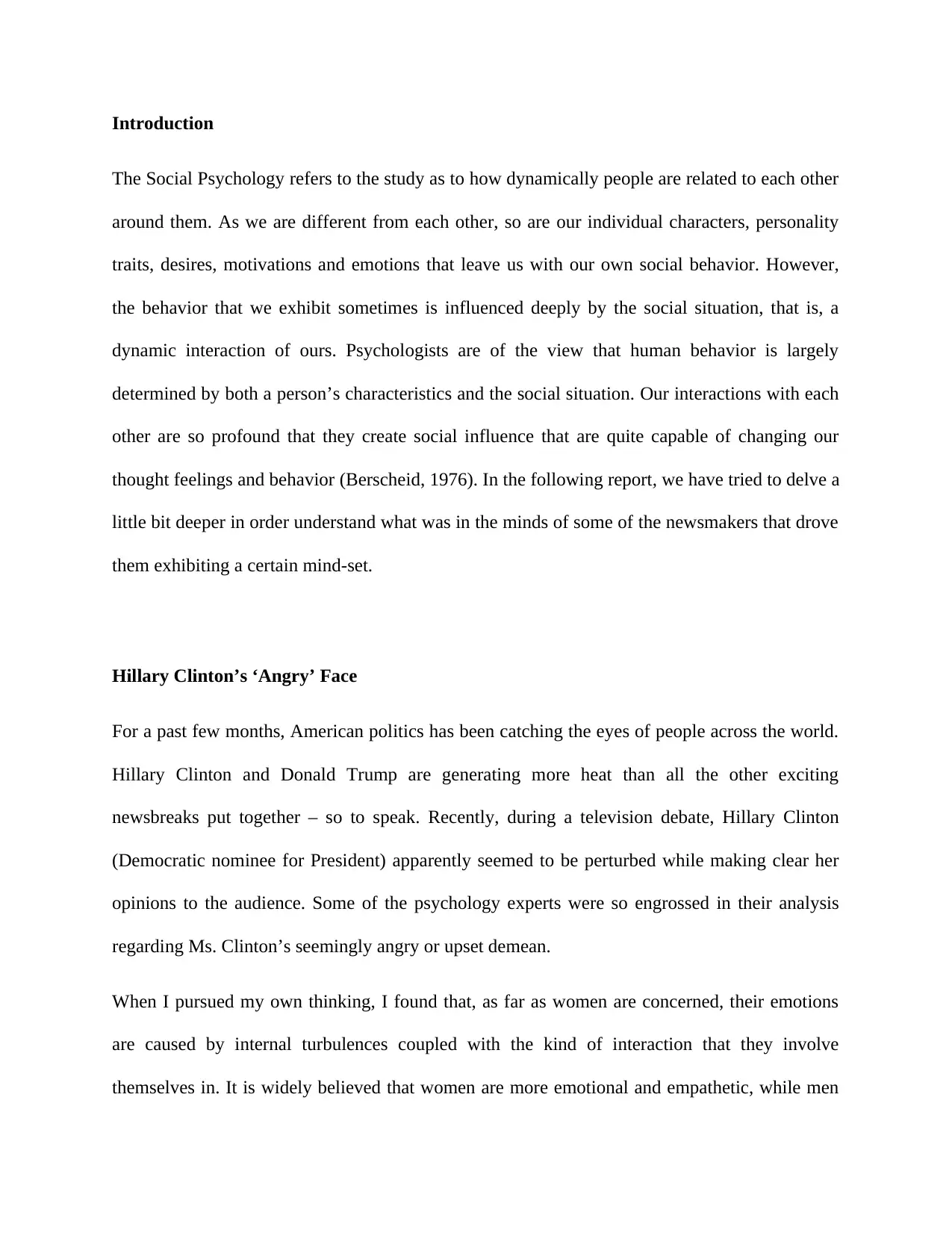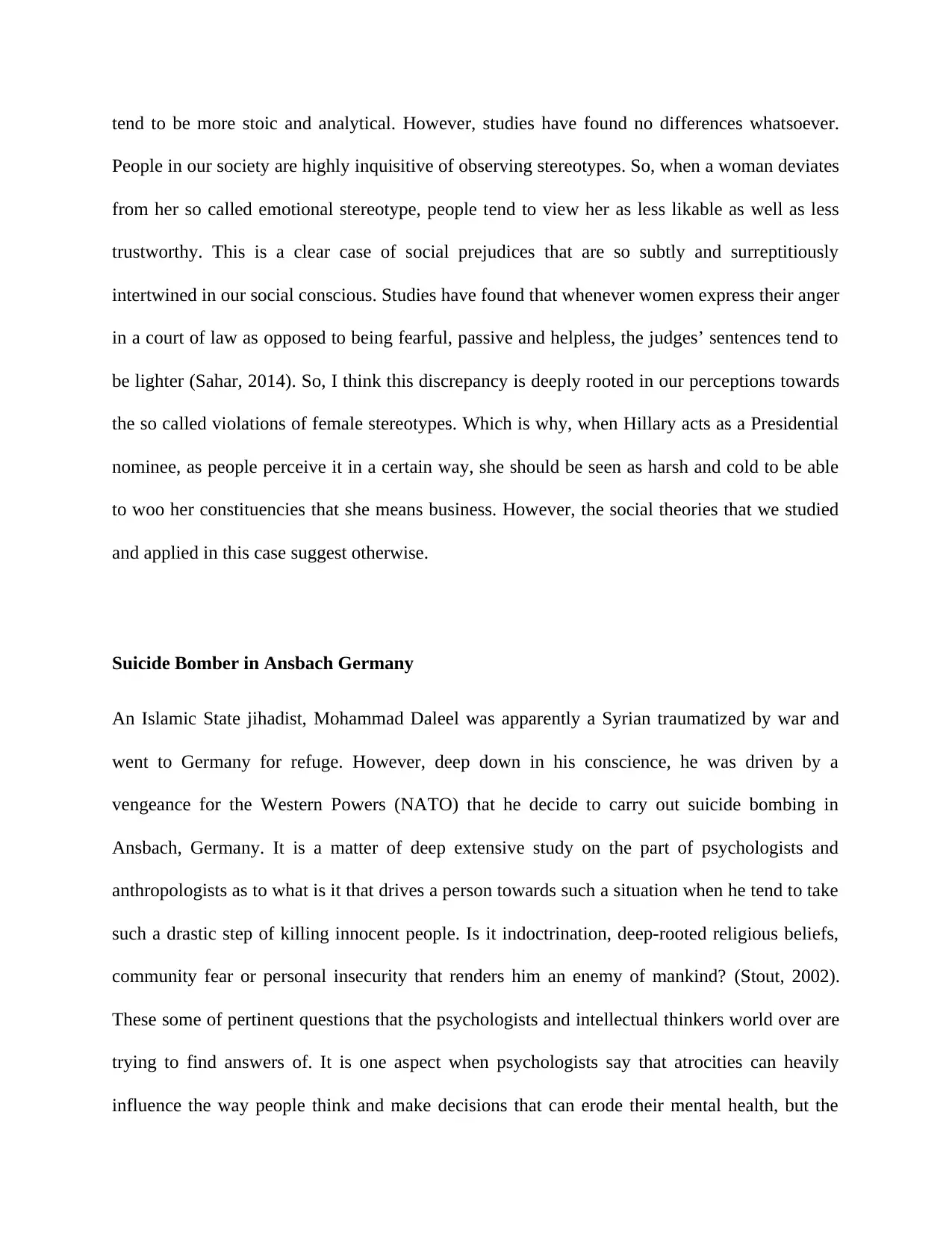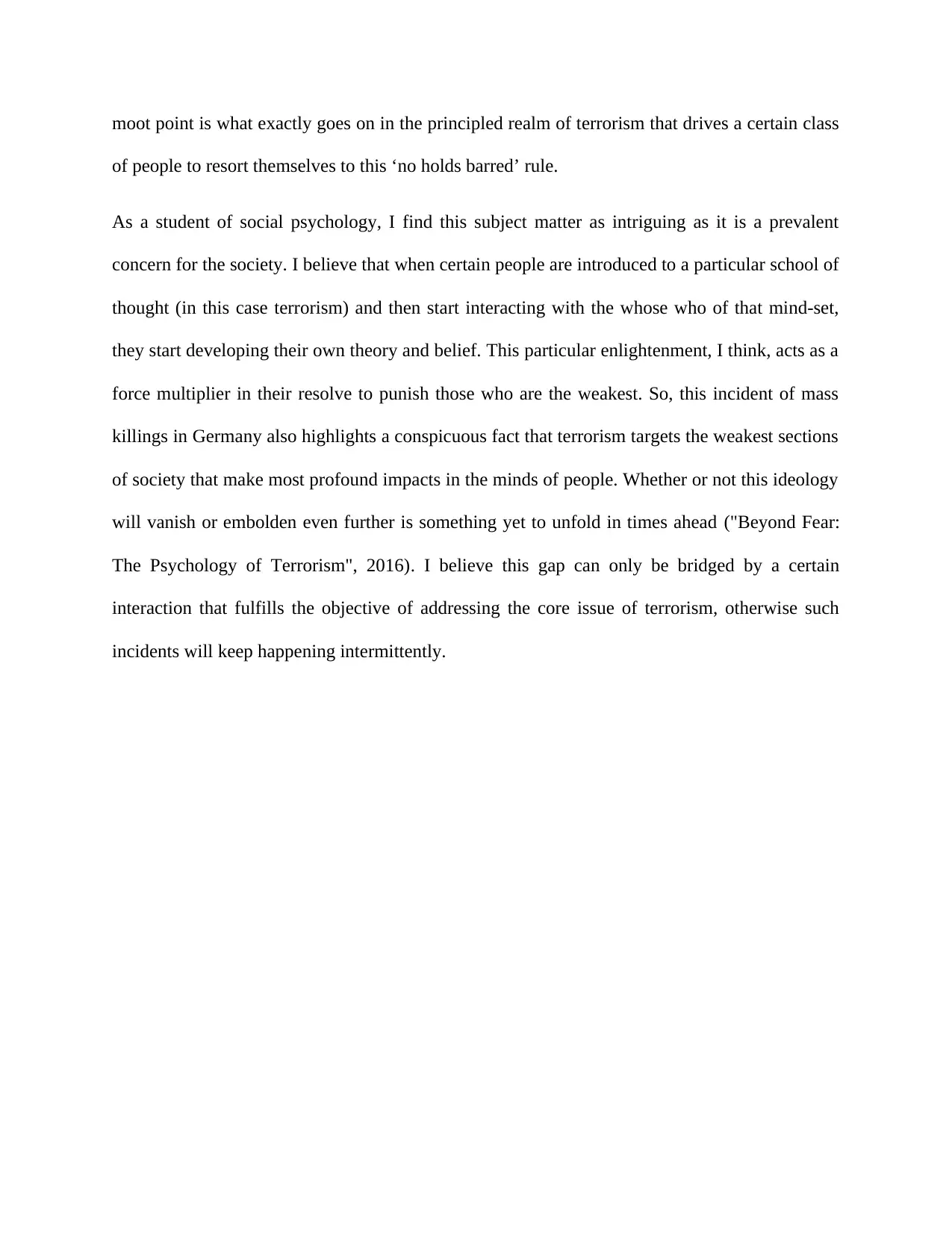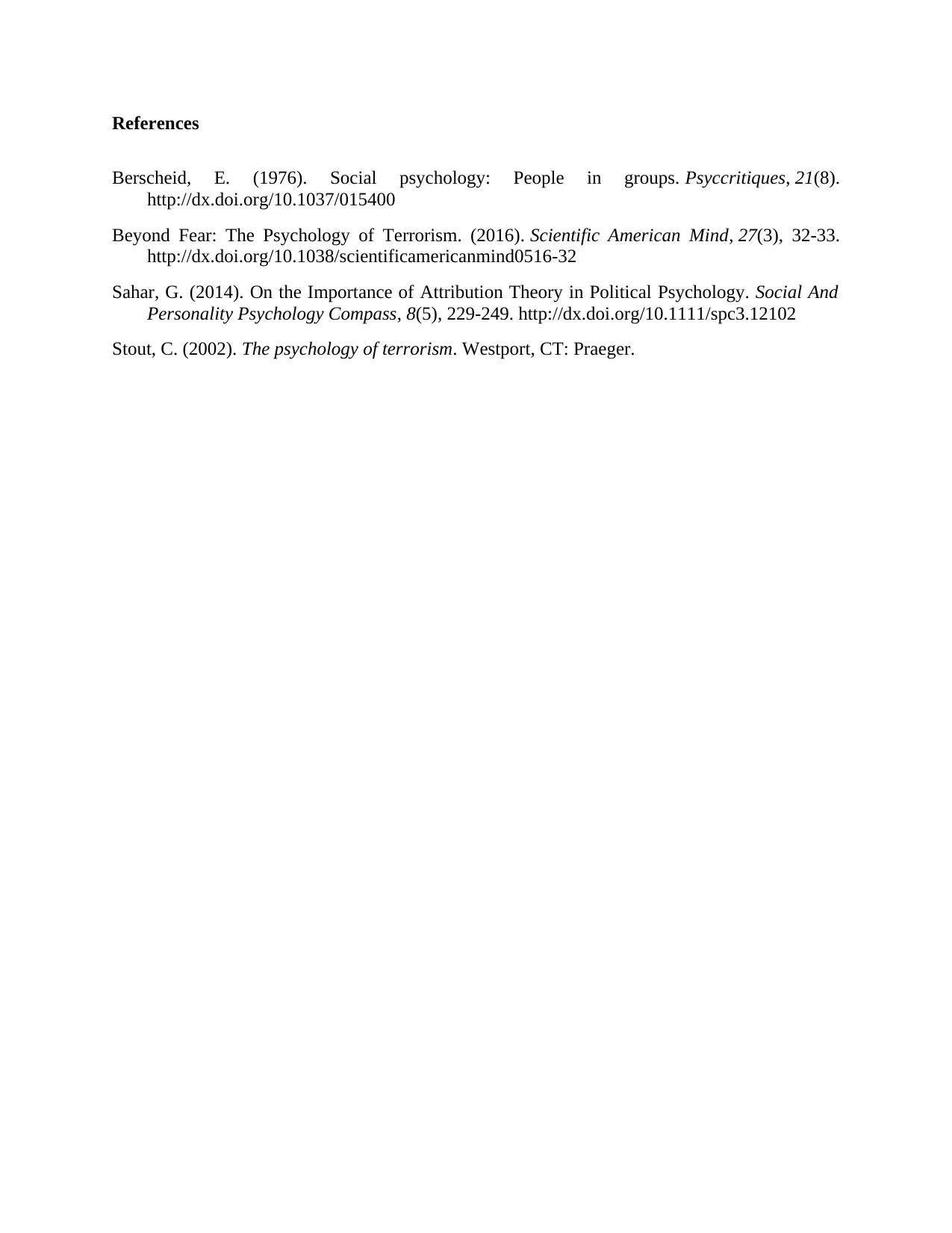Social Psychology Report: News Analysis
VerifiedAdded on 2019/09/25
|4
|1002
|633
Report
AI Summary
This report delves into social psychology by analyzing two distinct news events: Hillary Clinton's perceived 'angry' demeanor during a political debate and the suicide bombing in Ansbach, Germany. It explores how social situations and stereotypes influence perceptions of women in politics, and examines the psychological factors that may drive individuals towards terrorism. The report uses social psychology theories to understand these complex behaviors and their impact on society, highlighting the importance of addressing the root causes of such issues.

Introduction
The Social Psychology refers to the study as to how dynamically people are related to each other
around them. As we are different from each other, so are our individual characters, personality
traits, desires, motivations and emotions that leave us with our own social behavior. However,
the behavior that we exhibit sometimes is influenced deeply by the social situation, that is, a
dynamic interaction of ours. Psychologists are of the view that human behavior is largely
determined by both a person’s characteristics and the social situation. Our interactions with each
other are so profound that they create social influence that are quite capable of changing our
thought feelings and behavior (Berscheid, 1976). In the following report, we have tried to delve a
little bit deeper in order understand what was in the minds of some of the newsmakers that drove
them exhibiting a certain mind-set.
Hillary Clinton’s ‘Angry’ Face
For a past few months, American politics has been catching the eyes of people across the world.
Hillary Clinton and Donald Trump are generating more heat than all the other exciting
newsbreaks put together – so to speak. Recently, during a television debate, Hillary Clinton
(Democratic nominee for President) apparently seemed to be perturbed while making clear her
opinions to the audience. Some of the psychology experts were so engrossed in their analysis
regarding Ms. Clinton’s seemingly angry or upset demean.
When I pursued my own thinking, I found that, as far as women are concerned, their emotions
are caused by internal turbulences coupled with the kind of interaction that they involve
themselves in. It is widely believed that women are more emotional and empathetic, while men
The Social Psychology refers to the study as to how dynamically people are related to each other
around them. As we are different from each other, so are our individual characters, personality
traits, desires, motivations and emotions that leave us with our own social behavior. However,
the behavior that we exhibit sometimes is influenced deeply by the social situation, that is, a
dynamic interaction of ours. Psychologists are of the view that human behavior is largely
determined by both a person’s characteristics and the social situation. Our interactions with each
other are so profound that they create social influence that are quite capable of changing our
thought feelings and behavior (Berscheid, 1976). In the following report, we have tried to delve a
little bit deeper in order understand what was in the minds of some of the newsmakers that drove
them exhibiting a certain mind-set.
Hillary Clinton’s ‘Angry’ Face
For a past few months, American politics has been catching the eyes of people across the world.
Hillary Clinton and Donald Trump are generating more heat than all the other exciting
newsbreaks put together – so to speak. Recently, during a television debate, Hillary Clinton
(Democratic nominee for President) apparently seemed to be perturbed while making clear her
opinions to the audience. Some of the psychology experts were so engrossed in their analysis
regarding Ms. Clinton’s seemingly angry or upset demean.
When I pursued my own thinking, I found that, as far as women are concerned, their emotions
are caused by internal turbulences coupled with the kind of interaction that they involve
themselves in. It is widely believed that women are more emotional and empathetic, while men
Paraphrase This Document
Need a fresh take? Get an instant paraphrase of this document with our AI Paraphraser

tend to be more stoic and analytical. However, studies have found no differences whatsoever.
People in our society are highly inquisitive of observing stereotypes. So, when a woman deviates
from her so called emotional stereotype, people tend to view her as less likable as well as less
trustworthy. This is a clear case of social prejudices that are so subtly and surreptitiously
intertwined in our social conscious. Studies have found that whenever women express their anger
in a court of law as opposed to being fearful, passive and helpless, the judges’ sentences tend to
be lighter (Sahar, 2014). So, I think this discrepancy is deeply rooted in our perceptions towards
the so called violations of female stereotypes. Which is why, when Hillary acts as a Presidential
nominee, as people perceive it in a certain way, she should be seen as harsh and cold to be able
to woo her constituencies that she means business. However, the social theories that we studied
and applied in this case suggest otherwise.
Suicide Bomber in Ansbach Germany
An Islamic State jihadist, Mohammad Daleel was apparently a Syrian traumatized by war and
went to Germany for refuge. However, deep down in his conscience, he was driven by a
vengeance for the Western Powers (NATO) that he decide to carry out suicide bombing in
Ansbach, Germany. It is a matter of deep extensive study on the part of psychologists and
anthropologists as to what is it that drives a person towards such a situation when he tend to take
such a drastic step of killing innocent people. Is it indoctrination, deep-rooted religious beliefs,
community fear or personal insecurity that renders him an enemy of mankind? (Stout, 2002).
These some of pertinent questions that the psychologists and intellectual thinkers world over are
trying to find answers of. It is one aspect when psychologists say that atrocities can heavily
influence the way people think and make decisions that can erode their mental health, but the
People in our society are highly inquisitive of observing stereotypes. So, when a woman deviates
from her so called emotional stereotype, people tend to view her as less likable as well as less
trustworthy. This is a clear case of social prejudices that are so subtly and surreptitiously
intertwined in our social conscious. Studies have found that whenever women express their anger
in a court of law as opposed to being fearful, passive and helpless, the judges’ sentences tend to
be lighter (Sahar, 2014). So, I think this discrepancy is deeply rooted in our perceptions towards
the so called violations of female stereotypes. Which is why, when Hillary acts as a Presidential
nominee, as people perceive it in a certain way, she should be seen as harsh and cold to be able
to woo her constituencies that she means business. However, the social theories that we studied
and applied in this case suggest otherwise.
Suicide Bomber in Ansbach Germany
An Islamic State jihadist, Mohammad Daleel was apparently a Syrian traumatized by war and
went to Germany for refuge. However, deep down in his conscience, he was driven by a
vengeance for the Western Powers (NATO) that he decide to carry out suicide bombing in
Ansbach, Germany. It is a matter of deep extensive study on the part of psychologists and
anthropologists as to what is it that drives a person towards such a situation when he tend to take
such a drastic step of killing innocent people. Is it indoctrination, deep-rooted religious beliefs,
community fear or personal insecurity that renders him an enemy of mankind? (Stout, 2002).
These some of pertinent questions that the psychologists and intellectual thinkers world over are
trying to find answers of. It is one aspect when psychologists say that atrocities can heavily
influence the way people think and make decisions that can erode their mental health, but the

moot point is what exactly goes on in the principled realm of terrorism that drives a certain class
of people to resort themselves to this ‘no holds barred’ rule.
As a student of social psychology, I find this subject matter as intriguing as it is a prevalent
concern for the society. I believe that when certain people are introduced to a particular school of
thought (in this case terrorism) and then start interacting with the whose who of that mind-set,
they start developing their own theory and belief. This particular enlightenment, I think, acts as a
force multiplier in their resolve to punish those who are the weakest. So, this incident of mass
killings in Germany also highlights a conspicuous fact that terrorism targets the weakest sections
of society that make most profound impacts in the minds of people. Whether or not this ideology
will vanish or embolden even further is something yet to unfold in times ahead ("Beyond Fear:
The Psychology of Terrorism", 2016). I believe this gap can only be bridged by a certain
interaction that fulfills the objective of addressing the core issue of terrorism, otherwise such
incidents will keep happening intermittently.
of people to resort themselves to this ‘no holds barred’ rule.
As a student of social psychology, I find this subject matter as intriguing as it is a prevalent
concern for the society. I believe that when certain people are introduced to a particular school of
thought (in this case terrorism) and then start interacting with the whose who of that mind-set,
they start developing their own theory and belief. This particular enlightenment, I think, acts as a
force multiplier in their resolve to punish those who are the weakest. So, this incident of mass
killings in Germany also highlights a conspicuous fact that terrorism targets the weakest sections
of society that make most profound impacts in the minds of people. Whether or not this ideology
will vanish or embolden even further is something yet to unfold in times ahead ("Beyond Fear:
The Psychology of Terrorism", 2016). I believe this gap can only be bridged by a certain
interaction that fulfills the objective of addressing the core issue of terrorism, otherwise such
incidents will keep happening intermittently.
⊘ This is a preview!⊘
Do you want full access?
Subscribe today to unlock all pages.

Trusted by 1+ million students worldwide

References
Berscheid, E. (1976). Social psychology: People in groups. Psyccritiques, 21(8).
http://dx.doi.org/10.1037/015400
Beyond Fear: The Psychology of Terrorism. (2016). Scientific American Mind, 27(3), 32-33.
http://dx.doi.org/10.1038/scientificamericanmind0516-32
Sahar, G. (2014). On the Importance of Attribution Theory in Political Psychology. Social And
Personality Psychology Compass, 8(5), 229-249. http://dx.doi.org/10.1111/spc3.12102
Stout, C. (2002). The psychology of terrorism. Westport, CT: Praeger.
Berscheid, E. (1976). Social psychology: People in groups. Psyccritiques, 21(8).
http://dx.doi.org/10.1037/015400
Beyond Fear: The Psychology of Terrorism. (2016). Scientific American Mind, 27(3), 32-33.
http://dx.doi.org/10.1038/scientificamericanmind0516-32
Sahar, G. (2014). On the Importance of Attribution Theory in Political Psychology. Social And
Personality Psychology Compass, 8(5), 229-249. http://dx.doi.org/10.1111/spc3.12102
Stout, C. (2002). The psychology of terrorism. Westport, CT: Praeger.
1 out of 4
Your All-in-One AI-Powered Toolkit for Academic Success.
+13062052269
info@desklib.com
Available 24*7 on WhatsApp / Email
![[object Object]](/_next/static/media/star-bottom.7253800d.svg)
Unlock your academic potential
Copyright © 2020–2026 A2Z Services. All Rights Reserved. Developed and managed by ZUCOL.